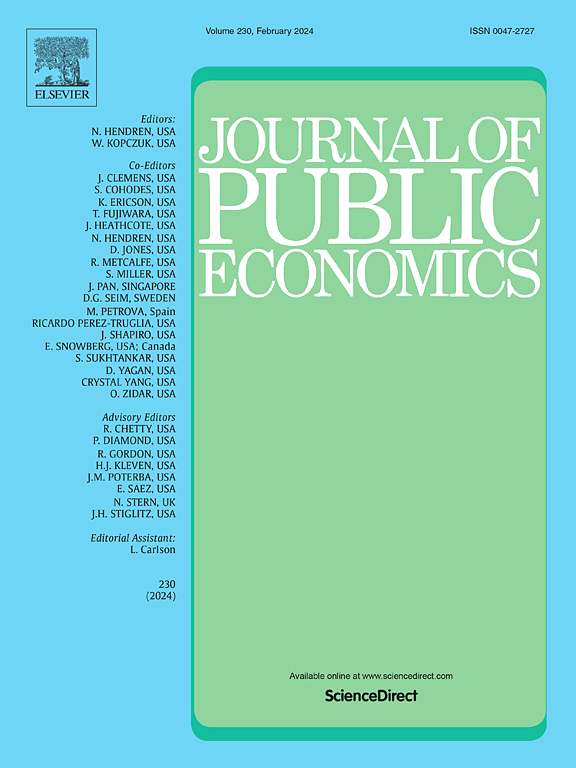The influence of inheritances on wealth inequality in rich countries
IF 3.4
1区 经济学
Q1 ECONOMICS
引用次数: 0
Abstract
This paper uses survey data from Germany, Spain, France, Italy, Great Britain and the United States to analyze how inheritances impact wealth inequality in a range of rich countries. Adopting an influence function regression approach, the paper calculates the counterfactual effects of small increases in the share of recipients of different-sized wealth transfers in each country. Results suggest that while a marginal increase in inheritance recipients generally contracts wealth inequality measures—confirming a common finding in the literature that inter-generational transfers tend to reduce relative wealth inequality—an increase in recipients of ‘large’ inheritances has the opposite effect. We determine what ‘large’ means in this context by point-estimating the thresholds above which transfers become disequalising. We find that transfers above the ninety-fifth percentile of the national transfer distribution are generally associated with an increasing effect on wealth inequality. Such thresholds are then put in perspective against the inheritance tax schedules in place in the six countries analyzed. No unique pattern emerges. While the thresholds are very close to tax exemption thresholds in Britain and Germany, they are somewhat higher in France and Spain and they are much lower in Italy and the United States.
遗产对富裕国家财富不平等的影响
本文使用来自德国、西班牙、法国、意大利、英国和美国的调查数据来分析遗产如何影响一系列富裕国家的财富不平等。采用影响函数回归方法,本文计算了每个国家不同规模财富转移的接受者份额小幅增加的反事实效应。结果表明,虽然遗产接受者的边际增加通常会收缩财富不平等的衡量标准——证实了文献中的一个共同发现,即代际转移往往会减少相对的财富不平等——但“大额”遗产接受者的增加会产生相反的效果。我们通过点估计阈值来确定“大”在这种情况下意味着什么,超过阈值,转移就会变得不平等。我们发现,超过全国转移分配95%的转移通常与对财富不平等的影响越来越大有关。然后,将这些起点与所分析的六个国家的遗产税时间表进行比较。没有独特的模式出现。虽然门槛非常接近英国和德国的免税门槛,但法国和西班牙的门槛略高,而意大利和美国的门槛要低得多。
本文章由计算机程序翻译,如有差异,请以英文原文为准。
求助全文
约1分钟内获得全文
求助全文
来源期刊

Journal of Public Economics
ECONOMICS-
CiteScore
14.10
自引率
2.00%
发文量
139
审稿时长
70 days
期刊介绍:
The Journal of Public Economics aims to promote original scientific research in the field of public economics, focusing on the utilization of contemporary economic theory and quantitative analysis methodologies. It serves as a platform for the international scholarly community to engage in discussions on public policy matters.
 求助内容:
求助内容: 应助结果提醒方式:
应助结果提醒方式:


